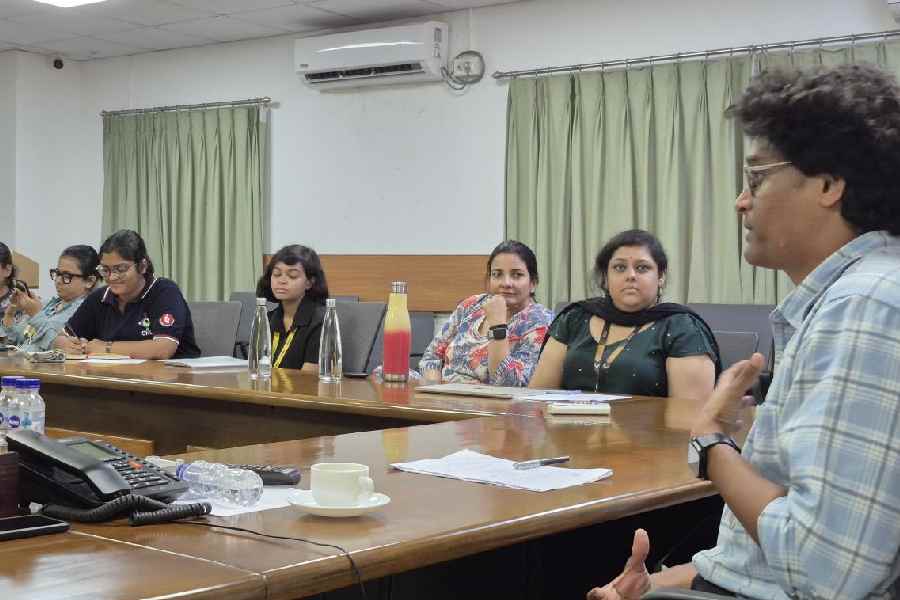What happens when poetry is not just read, but heard line by line, heart to heart, and interpreted in a room that listens?
The boardroom at Sister Nivedita University turned into just such a space for Quill, a poetry workshop organised by the department of English, in collaboration with The Conversationalist’s Club.
Convened by Debdatta Mitra and co-convened by Sudesha Das, both faculty members, the session was mentored by Prayag Ray, assistant professor of English at St Xavier’s University. With his guidance, Quill shifted the focus from applause to attention.
“A poem is not a product but a process,” said Ray, before he was felicitated by Arindam Basu, faculty, department of mass communication and Monikinkini Basu, head of the English department. “We wanted to create a space where poetry isn’t just performed but explored”, said Basu. “Workshops like Quill allow students to slow down and listen to each other and to themselves. That kind of attentiveness is rare but essential.”
Intimate audience
To maintain the intimacy and depth of engagement, the number of participants was limited to five, allowing for detailed feedback, individual attention, and space for open conversation. Each student-poet came from a different discipline, carrying a poem of their own and a piece of their world with it.
Prapti Samaddar, a computer science engineering student, opened the reading circle with The Cursed Moss, a piece rich with imagery of natural decay. Ray noted how moss, in her poem, functioned metaphorically like memory, “velvety on the surface but rooted in rot.” Fellow students chimed in with interpretations, creating a vibrant dialogue around a single image.
Then came Ashika Saha, an English honours student, whose poem All My Pain is Mine to Keep offered a stark refusal of comfort. Ray described it as a poetic performance of solitude, situating it alongside voices like poet Kamala Das and celebrating the poem’s raw tone.
Priyanka Das from the English department followed with Robbed Childhood, an unflinching reflection on broken innocence. Ray commended its refusal to dramatise grief, using the poem to open a nuanced discussion on silence as a literary strategy.
From the history department, Aastha Anand presented To Be Drizzled by Love, a poem whose language felt ephemeral. Ray explored its gentle temporality and kinship with romantic lyricism while peers reflected on the use of texture and mood.
Finally, Vidushi Agarwal from the psychology department shared Womanhood Knocked on My Door, a poem rooted in lived experience and wide in implication. Ray read it as an exploration of gendered subjectivity, drawing connections to Carol Ann Duffy and urging the group to reflect on the politics of poetic voice.
What distinguished the session was Ray’s style of mentorship. He reread lines aloud, hearing them anew, and encouraged students to reflect, question and push their own readings deeper. “This was my first time doing a workshop like this, not a lecture but something open-ended. And I was worried.… Would the students take criticism badly? But they didn’t. They really engaged. That openness was rare and meaningful,” he said. “Poetry is about attention. Staying with a phrase, a feeling, and letting it open slowly. That’s what we tried to do.”
He drew from his own experience in poetry circles during his PhD days in Ireland and expressed his hope that more such spaces could emerge across the city.
“There was no fear of being judged,” said Ashika Saha. “It felt like we were being heard, not just our poems but our thoughts too.”
“Usually workshops are about impressing, but here it was about expressing and improving,” added Priyanka Das.
Debdatta Mitra, the workshop’s convenor, closed the session with a heartfelt vote of thanks. “Quill was born from a desire to create a space for listening, for careful, honest critique. We wanted students to experience what it means to write and be read with care,” Mitra said.










